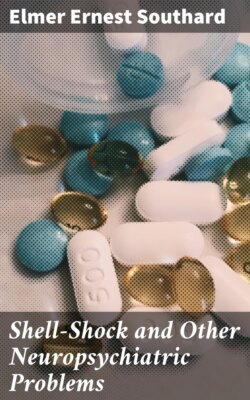Читать книгу Shell-Shock and Other Neuropsychiatric Problems - Elmer Ernest Southard - Страница 60
На сайте Литреса книга снята с продажи.
ОглавлениеWeakling, twice buried by shell explosions in one day: Change of character; fear; three fugues (“It is stronger than I am”).
Case 52. (Pactet and Bonhomme, July, 1917.)
An infantryman, Class of 1913, at the front from September, 1914, had a somewhat infantile build physically but was intellectually of average powers, having been a type-setter (three years in a job). However, the confined life had borne hard upon him and his father put him on a farm. He passed through his military service successfully, though he was given two weeks in the guardhouse for overstaying Easter leave. He was suggestible enough at this time to think that he would not be punished very severely, since there were other men whose leaves did not expire at the same time as his own.
He was buried twice in the same morning, March, 1915, at Bois Le Prêtre, spent four or five days in hospital, and went back to his battalion. But now there was a change in his character. Formerly indifferent to danger, he was now apprehensive every time he went to the line and felt an almost irresistible impulse to make for the rear. He was condemned to five years in prison, June, 1915, but was finally sent back to the front.
However, in July he left his company a second time as it was going into the trenches, and this time the captain simply asked him to do better. A third fugue, a few weeks later, sent him back to court-martial, and thence to be examined by alienists. He was perfectly conscious at the time of the fugues and understood his duties and possible punishments. All he would say was, “It is stronger than I am.” Fear outweighed every consideration after the episode of the shell burials.
The man may be regarded as a hypobulic, somewhat feebleminded person, able to get on in civil life but thrown out of gear by war. Of course, the concept of fear as a disease can easily be overdone; however, here was a case in which three desertions occurred; the third after severe punishment. In the differential diagnosis, epilepsy, alcoholism, impulsive poriomania, must be considered, as well as feeblemindedness.
III. EPILEPTOSES
(THE EPILEPTIC GROUP)
Table of Contents
